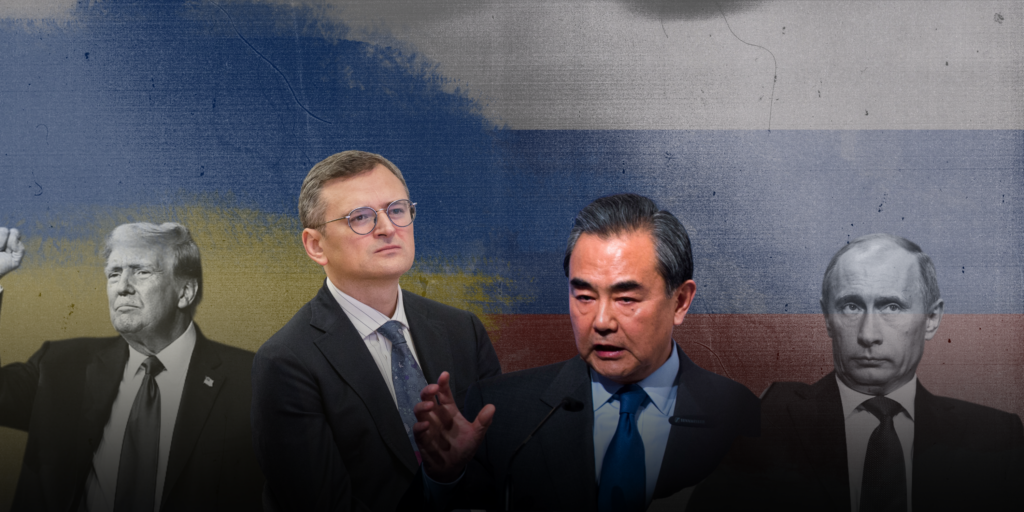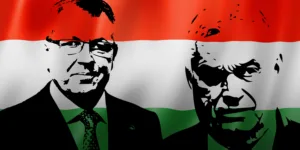In China’s state-owned media and among online commentators, Ukrainian Foreign Minister Dmytro Kuleba’s visit to Guangzhou and Hong Kong in July 2024 has been framed as a turning point in the Russia-Ukraine war. Coupled with the growing possibility of Donald Trump’s re-election as US president in November and his ambiguous views on supporting Ukraine, China’s state media is confident that Kyiv’s position on the war will increasingly become similar to Beijing’s.
Between July 23rd and 26th, Dmytro Kuleba, Ukraine’s foreign minister, met with his Chinese counterpart Wang Yi in China’s industrial and trade hub Guangzhou. This was the first visit to China by a high-ranking Ukrainian government official since the full-scale invasion of Ukraine by Russia in February 2022. While a visit to Guangzhou by Ukraine’s foreign minister formally does not rank as highly as Russian President Vladimir Putin’s recent visit to Beijing, it was still widely viewed as an important trip. The main topic of the meeting was ending the Russia-Ukraine War, in which China portrays itself as a neutral actor capable of mediating between the two sides. Bilateral trade and partnerships between China and Ukraine were also part of the discussions.
The Ukrainian Ministry of Foreign Affairs’ official report on the meeting emphasized China’s interest in ending the Russia-Ukraine war, apparently due to China’s economic ties to Europe. It also stated that Ukraine is willing to engage in dialogue with Russia at a certain point, but only when it sees willingness from Moscow to negotiate “in good faith”.
Official Chinese communication and state media reports emphasized China’s self-proclaimed neutral position in the “Russia-Ukraine conflict”. (The word “war” is avoided in official Chinese parlance, apparently so as not to contradict the Kremlin’s “special military operation” narrative.) In this context, China is portrayed as the voice and leader of the Global South, standing for a neutral, negotiations-based solution to the war, in contrast with the United States, which Beijing says is mainly interested in its own hegemonic pursuits.
According to experts interviewed by Chinese state media and popular online commentators, Kuleba’s efforts were mostly portrayed as desperate and motivated by Kyiv’s fear of Donald Trump’s potential reelection as US president in November, which could spell the end of US support for Ukraine from 2025 onwards. The same sources also portrayed Kuleba’s visit as a way of apologizing for not respecting China’s position enough in the past. In this regard, Ukrainian President Volodymyr Zelenskyy’s critical comments about China’s role in the war during the June 2024 Shangri-La Forum were the main reference point. Chinese experts and commentators thus expect Kyiv to increasingly accept China’s criteria for peacemaking and saw Kuleba’s visit as a first step in this direction.
Official Media Celebrates China’s Neutrality, Leadership
The Chinese Ministry of Foreign Affairs’ official report on the meeting between Kuleba and Wang Yi was mainly based on the latter’s remarks. He praised Ukraine’s friendly relations with China, noting that Ukraine was among the first countries to join the Chinese government’s Belt and Road Initiative. In Wang Yi’s view, although the “conditions and time are not yet ripe”, both Russia and Ukraine, to various extents, have signaled their willingness to enter into peace talks. According to Wang Yi, Beijing is ready to contribute to the peace process in constructive ways. The Ministry of Foreign Affairs’ official report noted that Kuleba, in return, expressed Ukraine’s support for China’s position on “One China”, regarding the status of Taiwan. The Kyiv-based Ukrainian National News Agency (UNN) also noted this, referring to the Chinese Ministry of Foreign Affairs’ Press Service as its source.
Chinese state-owned media outlets were particularly focused on showcasing China’s neutrality and leadership during Kuleba’s visit. A report on Global Times Online (环球网)—titled “Ukraine’s Foreign Minister Sends an Important Signal in China” and with more than 100,000 readers on WeChat, as of August 8, 2024—is an important case in point. It lists several Chinese Communist Party (CCP) slogans and initiatives related to the Ukraine conflict, such as President Xi Jinping’s “four should do’s” (四个应该) on ending the war, the recent China-Brazil “six-point consensus”, and the talks between Li Hui, Beijing’s Special Representative on Eurasian Affairs, and various parties as important guidelines towards a lasting peace. Similarly to the Chinese government’s earlier 12-point “position paper” on ending the war in Ukraine, these sources contain few concrete conditions for ending the war, emphasizing general principles instead, such as the importance of maintaining dialogue.
A report by state-owned Guancha News (观察者网) quoted remarks made by the Chinese foreign ministry’s spokesperson Mao Ning that emphasized China’s role in bringing together Global South nations to exchange views on ending the war in Ukraine. Li Hui’s visits to Brazil, South Africa, and Indonesia in late July 2024 were mentioned in order to underpin Beijing’s claim that it represents the voices of the Global South.
A commentary piece by Tang Zhonchao, a researcher at the China Institute of International Studies (CIIS), published by state-owned news outlet China.org (中国网), placed China’s peace efforts in Ukraine amid a series of peace agreements reached in Beijing, such as the Iranian-Saudi agreement of March 2023 and the July 2024 Fatah-Hamas agreement. These were framed as manifestations of the CCP’s “Global Initiatives” (on Development, Security, and Civilization) and its notion of a “Community of Common Destiny for Mankind”.
Other state media articles focused on the bilateral agreements reached between China and Ukraine during Kuleba’s visit, praising China-Ukraine relations as a strong strategic partnership with mutual benefits. A report by state-owned Reference News (参考信息)—with 74,000 readers on WeChat, as of August 8, 2024—mostly reprinted the apparent remarks Kuleba made during the meeting. According to the report, he praised China-Ukraine ties, described China as a “great country” (“中国是一个伟大的国家”), and referenced an increase in Ukrainian agricultural exports to China and the establishment of regional partnerships between the two. It also reported Wang Yi’s remark on viewing China-Ukraine relations from a long-term perspective.
Experts, Online Commentators Focus on Upcoming US Presidential Election
While official state media narratives focused on showcasing China’s apparent neutrality and leadership over the Russia-Ukraine War, the elephant in the room for experts and online commentators was the upcoming US presidential election in November. Following Zelenskyy’s criticism of Beijing at the Shangri-La Forum in Singapore in June, the increasing possibility of a Trump second term in office was seen as the main reason why Kyiv is changing course in its relations with Beijing. According to this view, the potential end of substantial US military support for Ukraine provides a unique opportunity for China to take the initiative in defining the post-war order in Ukraine. Thus, various commentators argued that Kuleba arrived in China on a mission to “apologize” and “correct” Kyiv’s earlier course, and seriously engage with Beijing on ending the war.
Zhang Hong, a Research Fellow at the Chinese Academy of Social Sciences’ Institute of Russian, East European, and Central Asian Studies, was interviewed in the earlier-mentioned Global Times Online report. He emphasized the “turning point” narrative, arguing that there has been a “subtle change” in Kyiv’s attitude towards the war, signaled by Kuleba’s visit to China. Zhang saw the visit as a sign of Kyiv’s willingness to eventually enter into negotiations with Moscow.
Ding Jianwei, a former counselor of the Chinese Embassy in Ukraine and Senior Researcher at the Taihe Institute, a Beijing-based think tank, gave an interview to the state-owned Fengmian News (封面新闻) in which he claimed that Russia and Ukraine have taken a “180-degree turn” in their approaches towards ending the war. In Russia’s case, Ding referred to Moscow’s failure to defeat Ukraine militarily and the Kremlin’s increasing willingness to negotiate. He saw Kuleba’s visit to China as an “ice-breaking journey” to clarify misunderstandings between the two sides about their approaches to the war. According to Ding, the main obstacle to peace in Ukraine is the United States, which has failed to weaken Russia, as originally intended, but continues to see Ukraine as an “agent” of its own regional influence in Eastern Europe.
Liu Qingbin, a researcher of international economics and digital economy—who, under the name Qing Bin You Li (庆彬有理), has 1,54 million fans on Douyin, China’s version of TikTok, as of August 8, 2024—published an article on Kuleba’s visit—which had more than 100,000 reads on WeChat, as of the same day. His commentary revolved around Ukraine recognizing that it needs to bring its approach more in line with China’s out of fear of declining Western support in the coming years. The commentary also mentioned Zelenskyy’s “rude” speech towards China at the 2024 Shangri-La Forum, pointing out that both sides must restore confidence. He highlighted Kuleba’s reported remarks that Beijing needs to see China-Ukraine relations in the broader context of China-Europe relations. Liu, however, dismissed this as going against “long-term perspectives” on bilateral relations, as emphasized by Wang Yi during the meeting.
Tang Bohu, a journalist affiliated with the state-owned Phoenix News (凤凰网)—with around 852,000 Douyin fans, as of August 8, 2024—published an article on Kuleba’s visit that reached more than 100,000 WeChat views, as of the same day. His commentary focused on Russian reactions to Kuleba’s visit, arguing that Moscow’s limited reactions demonstrated that the Kremlin is confident that it did not impact China-Russia relations. In Tang’s commentary, Kyiv was depicted as desperate because of uncertainties over future Western military aid. He also noted that during the recent Shangri-La Forum, Zelenskyy “said some things to China that he should not have said” (对中国说了一些不该说的话), quoting the Ukrainian leader’s statement that China is “being used as a tool by Russia”. Hence, Kuleba’s visit was again depicted as a form of apology for these past mistakes.
A commentary by China.com Military Affairs (中华网军事)—which had 54,000 readers on WeChat, as of August 8, 2024—argued that Russia is dominating the battlefield in Ukraine and repeated some of the common tropes arguing that Ukraine is currently in a desperate situation. It argued that Trump wants to “sell Ukraine for a good price”, implying that he is more interested in using Ukraine for its own political goals than in restoring the country’s territorial integrity. Conversely, China was framed as Ukraine’s “savior” (救星) for being a neutral actor and capable mediator.
Many experts and commentators seem to agree that, among his many aims for the visit, Kuleba wanted to convince China’s leadership to attend the next Ukraine peace summit, which will be held in November 2024, according to Reuters. Chinese commentators generally viewed the previous peace summit held in Switzerland as producing no results due to Russia’s absence and because some major attendants from the Global South refused to sign its final declaration. According to Tang Bohu, the Swiss peace summit failed, but Kyiv’s current aim is to organize a peace summit that Beijing attends, possibly hoping that Beijing can convince Moscow to join. The China.com Military Affairs commentary shared the same view of Kyiv’s intention to motivate both Beijing and—via Beijing’s efforts—Moscow to attend the upcoming peace summit. In Liu Qing’s words, if all goes well, the next peace summit will go “according to China’s criteria” and include Russia and much of the Global South as participants.
China As Mediator in a Trump 2.0 Era?
The discourse on Kuleba’s visit to China shows that the Russia-Ukraine War continues to be seen mainly from the perspective of Beijing’s global geopolitical competition with Washington. State-owned media continued to tout China’s role as a neutral actor in the war, and that, as a supposed leader of Global South states, it shares their desire for the war to end. Kuleba’s visit was mainly seen as an opportunity to emphasize these points further. Experts and online commentators focused on Kyiv’s desperate situation due to the potential end or decline of US military support if Trump wins the November election. Thus, many voices think there is an emerging opportunity for China to take advantage of a potential vacuum in Western support for Kyiv and shape the post-war order in Ukraine and, by extension, in Europe.






